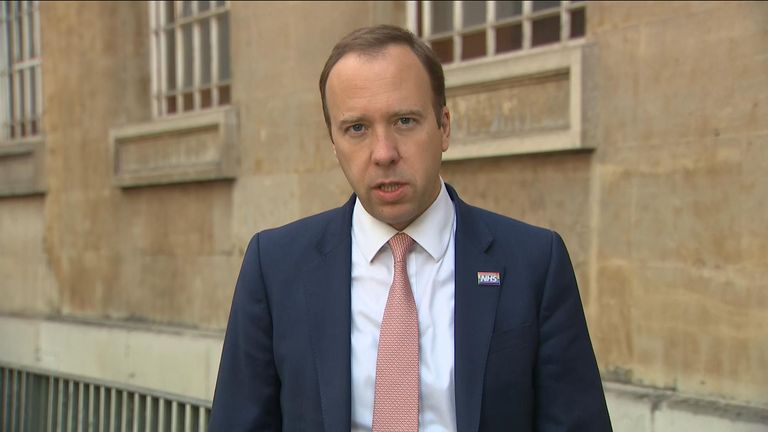Parts of the North West, West Yorkshire and the Midlands have been placed under further localised coronavirus restrictions.
The new measures, prompted by a fast rise in COVID-19 cases, have been confirmed by the Department for Health following consultation with local councils and MPs.
Live coverage of the latest coronavirus news and updates
Lancashire, Merseyside, Warrington and Halton are now being classed as “areas of intervention”, and fresh restrictions will come into force in Wolverhampton, Oadby & Wigston, and parts of Bradford, Kirklees and Calderdale.
Regulations and guidance differ between the areas, but all are due to come into force from Tuesday.
The North West
In Merseyside, Warrington, Halton and Lancashire (excluding Blackpool and Greater Manchester), the following restrictions will be enforced from Tuesday:
- residents must not socialise with other people outside of their own households or support bubble in private homes and gardens
- hospitality for food and drink will be restricted to table service only
- late night operating hours will be restricted, with leisure and entertainment venues including restaurants, pubs, and cinemas, required to close between 10pm and 5am
- residents are encouraged to only to use public transport for essential purposes, such as travelling to school or work
- residents are being urged to avoid attending amateur and semi-professional sporting events as spectators.
These rules will not apply to Bolton or Greater Manchester, where separate restrictions are already in place.
The Midlands
In Wolverhampton and Oadby & Wigston, residents will be banned from Tuesday from socialising with other people outside their own households or support bubbles in private homes and gardens.
People who are shielding in Leicester will no longer need to do so from 5 October.
West Yorkshire
All parts of Bradford, Kirklees and Calderdale will be banned from Tuesday from socialising with other people outside of their own households or support bubble in private homes and gardens.
Previously, some wards in these areas had been exempt from restrictions introduced at the start of August, but these exemptions will no longer apply.
People who are shielding in parts of North East Blackburn will no longer need to do so from 5 October.
The new restrictions in parts of the North West, West Yorkshire and the Midlands are in addition to the nationwide “rule of six” restrictions introduced across England on Monday.
Elsewhere in England, Blaby has become an “area of enhanced support” on the government’s coronavirus watchlist, while Selby, Scarborough and Spelthorne in Surrey have been added as “areas of concern”.
However, Swindon, Breckland, Great Yarmouth, Norwich, Broadland, North Norfolk, South Norfolk and King’s Lynn and West Norfolk have been removed from the watchlist after an improvement in infection rates.
:: Subscribe to the All Out Politics podcast on Apple Podcasts, Google Podcasts, Spotify, Spreaker
Health Secretary Matt Hancock said: “We are seeing cases of coronavirus rise fast in Lancashire, Merseyside, West Yorkshire, Warrington, Halton and Wolverhampton.
“Local leaders in these areas have asked for stronger restrictions to be put in place to protect local people, and we are acting decisively to support them.
“I know these restrictions will make everyday life harder for many, but I know that residents will work together and respect the rules so we can reduce rates of transmission.
“I urge local people to isolate and get a test if you have symptoms, follow the advice of NHS Test and Trace, and always remember ‘hands, face, space’.
“By sticking to these steps, we will get through this together.”
The addition of new measures in the North West, Midlands and West Yorkshire will mean that, from Tuesday, one in five of the UK population – just under 13 million people – will be living under extra restrictions.
New COVID-19 restrictions began in the North East on Friday.
An average of 6,000 people in England per day were estimated to be newly infected with coronavirus during the first week of September, the latest figures from the Office for National Statistics revealed on Friday.
Mr Hancock earlier explained to Sky News the need for further government action in some areas, while he also did not rule out a second national lockdown as a “last line of defence”.
Prime Minister Boris Johnson is considering the introduction of new national restrictions – possibly as soon as next week – but government figures stressed the plans being drawn up stopped short of a full national lockdown, as seen in the spring.


